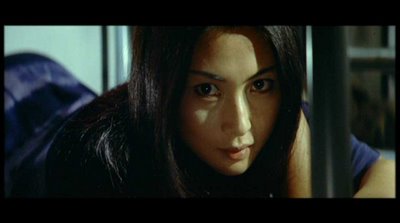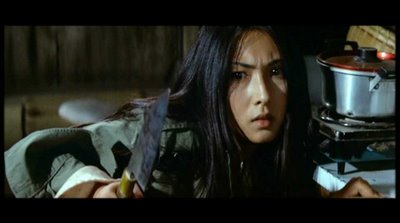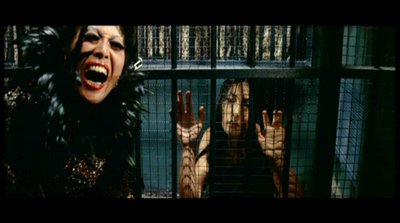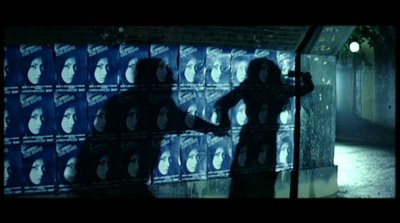 Few movie directors have ever loved a woman's face with the intensity that Shunya Ito loved the face of actress Meiko Kaji. His fascination with the fire of reproach in her bottomlessly black eyes is potently communicated in the three "Female Prisoner #701" films he directed: FEMALE PRISONER #701 SCORPION (1972, available on Tokyo Shock DVD), followed by two others released in 1973, FEMALE CONVICT SCORPION JAILHOUSE 41 (alas, Image Entertainment's essential DVD is now out of print and commanding big bucks) and FEMALE PRISONER #701 SCORPION: BEAST STABLE. Those of us who saw the first two have been on tenterhooks while waiting for the rest of the series to show up, and now Tokyo Shock -- a subsidiary of Media Blasters -- has finally released BEAST STABLE on DVD for the first time, along with the series' fourth and final entry, FEMALE PRISONER #701 SCORPION: GRUDGE SONG (likewise 1973), directed by series one-timer Yasyharu Hasebe.
Few movie directors have ever loved a woman's face with the intensity that Shunya Ito loved the face of actress Meiko Kaji. His fascination with the fire of reproach in her bottomlessly black eyes is potently communicated in the three "Female Prisoner #701" films he directed: FEMALE PRISONER #701 SCORPION (1972, available on Tokyo Shock DVD), followed by two others released in 1973, FEMALE CONVICT SCORPION JAILHOUSE 41 (alas, Image Entertainment's essential DVD is now out of print and commanding big bucks) and FEMALE PRISONER #701 SCORPION: BEAST STABLE. Those of us who saw the first two have been on tenterhooks while waiting for the rest of the series to show up, and now Tokyo Shock -- a subsidiary of Media Blasters -- has finally released BEAST STABLE on DVD for the first time, along with the series' fourth and final entry, FEMALE PRISONER #701 SCORPION: GRUDGE SONG (likewise 1973), directed by series one-timer Yasyharu Hasebe.Let's see that face again.
 Somehow the passive beauty of Meiko Kaji's face comes to fuller life when her character, Nami Matsushima (also known as Sasori, or "Scorpion"), is holding something sharp or standing victoriously in a pool of blood. But it comes to fullest life when she's looking over her shoulder, her dark eyes burning with hateful promise.
Somehow the passive beauty of Meiko Kaji's face comes to fuller life when her character, Nami Matsushima (also known as Sasori, or "Scorpion"), is holding something sharp or standing victoriously in a pool of blood. But it comes to fullest life when she's looking over her shoulder, her dark eyes burning with hateful promise.Sasori is part of the cinema's great lineage of avenging angels, like Myrna Loy in THIRTEEN WOMEN (1932), Jeanne Moreau in THE BRIDE WORE BLACK (1968), the ghostly little girl in Mario Bava's KILL, BABY... KILL! (1966), and of course, Uma Thurman's Beatrix Kiddo in KILL BILL, VOLUMES 1 and 2 (2003-04) -- a diptych clearly inspired by the "Female Prisoner Scorpion" films and Meiko Kaji's other vengeful showcase, LADY SNOWBLOOD (1973). Sasori is also the most poignantly, assertively, and positively feministic of these characters, though it helps her status that not a single man inhabiting her universe is anything but the lowest scum imaginable, regardless of social or official position. Like most of those other characters, Sasori stays mostly mute as she sets about evening a progressively cosmic scorecard (Beatrix Kiddo, being a creation of Quentin Tarantino, has much to say), so one never gets a proper sense of Meiko Kaji's abilities as an actress. But as screen presences go, she has a star quality that gets deeply under one's skin -- not least of all because, no matter how sordid the material, she never loses her dignity or her positive charge.
His name is not as well known here in America as those of Seijun Suzuki, Kinji Fukasaku, or even Nobuo Nakagawa, but I daresay that Shunya Ito was, or is, the most consistently powerful Japanese stylist of the bunch. The Japanese industry was clearly aware of his talent, too; the Toei trailer for the first "Female Prisoner Scorpion" film mentions him by name while stressing the importance of his debut, and the trailer for BEAST STABLE, made only one year later, hails it as the "masterpiece of his career." (Yes, already.) Perhaps his star burned too brightly, and perhaps it's a fault of research, but the IMDb shows BEAST STABLE followed by a nearly ten-year gap in his filmography.
I have not yet watched GRUDGE SONG, but for anyone wanting my recommendation for one or two handy, single-disc definitions of dazzling and audacious low-budget film technique, I would point to Mario Bava's BLACK SABBATH (or BLOOD AND BLACK LACE, take your pick) and, now, FEMALE PRISONER #701 SCORPION: BEAST STABLE. I would gladly assign credit to the cameraman, but the film itself doesn't appear to do so. From beginning to end, the visual invention is ceaseless though, miraculously, it never upstages the emotions of the story, which is functionally more of a multi-faceted character study than either of the previous two films. In fact, it's probably because this film is more intimately pitched that its technique is more compelling than in either of the earlier films, which are just as riveting in their own right.
The scene above is a classic example. Sasori, an escaped convict, is wanted by the law and is the particular quarry of a detective (Mikio Narita) who lost his arm while foolishly attempting to apprehend her on a subway train. Here, Sasori's presence is conveyed by a wall of almost preposterously sexy "Wanted" posters while her silhouette deals pointedly with the latest in a series of would-be captors. Later in her plight, she takes to hiding out in the sewers of Tokyo, where a friend (a hooker who sells glimpses of her sex, illuminated by however many matches she's paid to light) summons her by dropping matches through the grating of a manhole cover. The image of these matches plummeting through the darkness as she calls "Sasori... Sasori..." is so poignant and haunting that the director cannot resist increasing the speed and number of the matches falling, until the image becomes absolutely hallucinatory, a literal torch song. A throwaway scene in a nightclub is almost frighteningly hopped-up by frame-dropping, and even the dullest dialogue scene sticks in the memory due to a lamp that's allowed to swing in the foreground.
And then there are the other characters -- all tragic, some hateful. The aforementioned hooker, Yuki (Yayoi Watanabe), lives with an older brother reduced by a work-related accident to a sex-crazed vegetable. Incestuous rape has seasoned into numb, incestuous submission and unwanted pregnancy. Yuki meets Sasori in a cemetary; lying on the ground after sex-for-cash, a grating sound draws her attention to a nearby headstone, where she sees the fugitive glowering at her from afar, ferally holding in clenched teeth a man's severed arm, to which she is handcuffed, viciously filing the chain against the edge of the grave marker! (That's another thing about Shunya Ito's films: the story content is seldom less delirious than the technique.) There is another pregnant prostitute, too, and the most difficult sequence to endure counterpoints the two women's abortions -- one voluntary, the other not. It's not a graphic sequence, but the screams of the woman who wants to keep her baby are as bone-piercing as an arctic wind. Then there is the evil prostitution ringleader Katsu (Reisen Lee), an ugly, cackling, cross-eyed woman garbed in raven's feathers -- in each of the films, Sasori's beauty is contrasted with the ugliness of some opposing female -- who keeps a cage of ravens as a place of punishment. She is thrilled when Sasori (whom she knew in prison) falls into her clutches, but Sasori has her revenge... largely because she gets deeply under Katsu's skin, too.

The final act is gripping in the fever pitch of its delirium, but also irritating to the extent that it introduces minor details that compromise the film's otherwise perfect design. It involves Sasori being arrested for arson (we never learn the circumstances) and enacting two final acts of vengeance from behind bars. What is great about this section is that her presence in the prison may be a delusion of one of the inmates, driven crazy, and her persecution may not actually occur other than on the abstract planes of symbolism or madness. But a needless, penultimate voice-over suggests that Sasori really was there, an assertion that plays hob with the episode's delicious ambiguity and screams "studio interference." (Was this why Shunya Ito walked away from the series?) Despite this, the director follows the voice-over with one last tour de force -- a wholly visual, decorous moment that exists outside reality and even outside filmic reality -- that reasserts his artistic control and ties just the right bow around the overall package.
To the very end, FEMALE PRISONER SCORPION: BEAST STABLE holds one spellbound, enamored, disgusted, amused, and constantly on edge. It's an astonishing piece of work.
